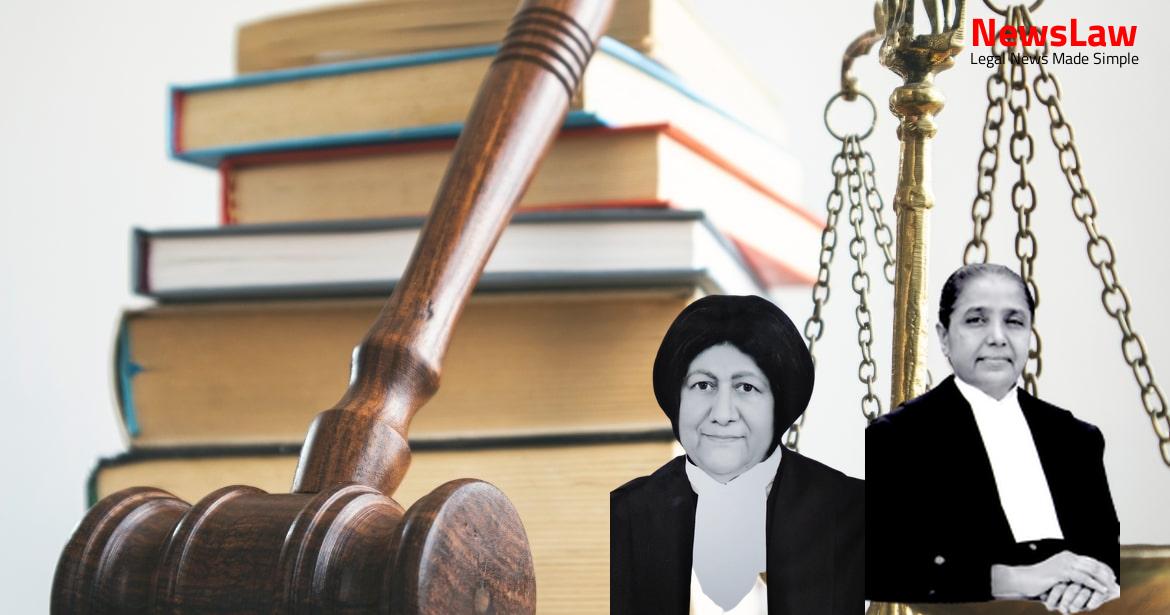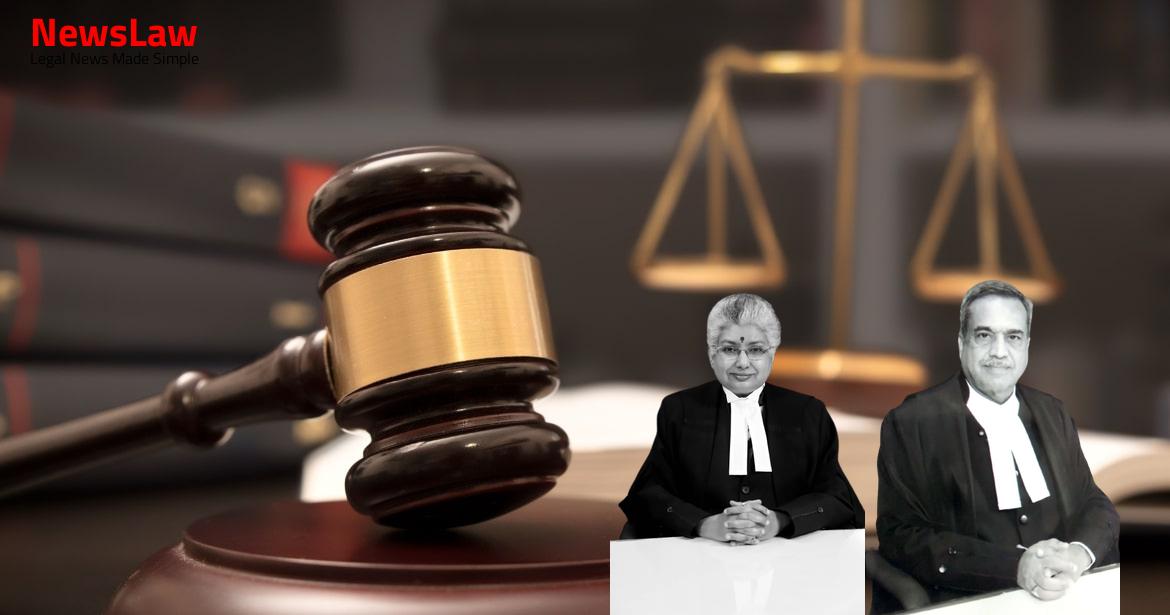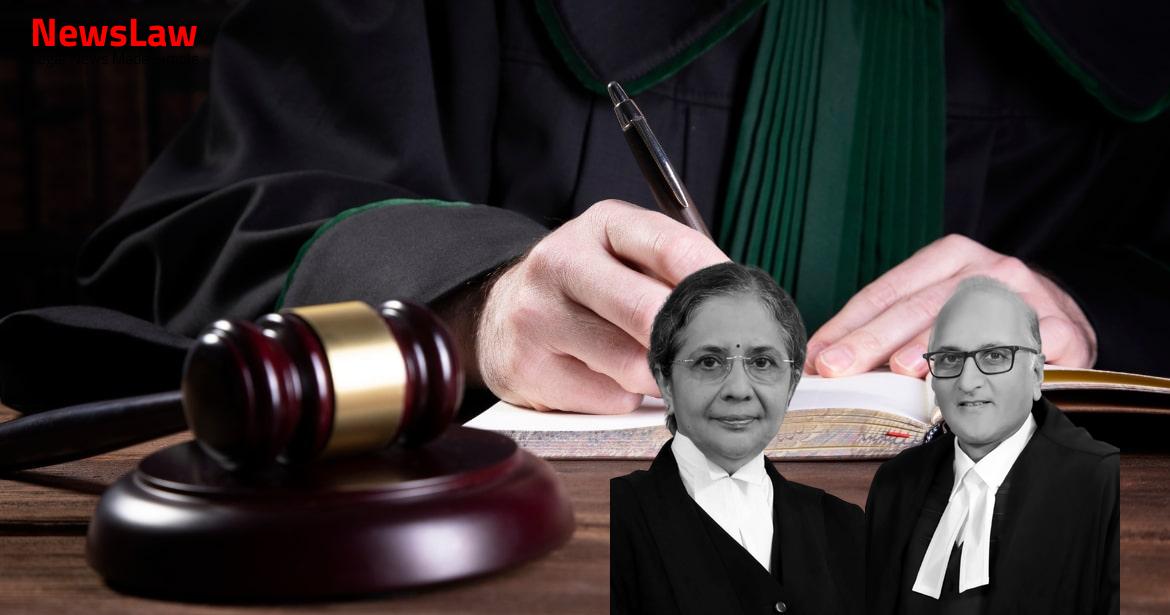Explore a legal case involving an ownership dispute in a motor vehicle insurance claim, highlighting the court’s meticulous analysis of key aspects such as registration status, insurance transfers, and liability under the Motor Vehicles Act. Delve into the intricacies of legal interpretations in insurance disputes affecting motor vehicle ownership.
Facts
- The National Commission set aside the orders of the District Forum and the State Commission, rejecting the concurrent finding of both fora.
- Ownership of the vehicle was claimed by the Appellant despite a sale agreement with Mohammad Iliyas Ansari.
- The Appellant continued paying instalments for the truck even after the sale agreement with Ansari.
- The Appellant had paid insurance premiums for the vehicle even after the sale agreement.
- No evidence was presented by the Insurer to prove that Mohammad Iliyas Ansari had paid the insurance premium.
- The truck was registered in the name of the Appellant, and no transfer had occurred to Mohammad Iliyas Ansari.
- The District Forum found in favor of the Appellant, stating that ownership had not been transferred to Ansari.
- The Insurer issued a show cause letter alleging the sale of the truck to Ansari, but the Appellant continued to be the registered owner at the time of the accident.
- The loan for the truck was being repaid by the Appellant, not by Ansari.
- The vehicle remained in the name of the Appellant in various documents, indicating continued ownership.
- The Appellant had replied to the show cause letter and sent a legal notice to the Insurer, which went unanswered.
- The Insurer disputed the claim based on submission by Ansari and delay in reporting the accident.
- The Appellant submitted a motor claim, but the Insurer refused to accept it.
- The Appellant sent the claim form and documents to the Insurer by Registered Post.
Also Read: Land Sale Dispute Legal Analysis
Issue
- Ownership of the truck in question was purportedly transferred on 11.4.2008.
- Driver Rajendra Singh’s employment status with the Appellant or Mohammad Iliyas Ansari is unclear.
- No steps were taken for the transfer of registration of the truck to Mohammad Iliyas Ansari.
- The Appellant continued to pay instalments to ICICI Bank even after the alleged transfer of ownership.
- The Appellant took out an insurance policy in his own name for the truck on 31.5.2011, raising questions about the ownership transfer.
- Absence of ‘No Objection’ from ICICI Bank raises questions about the legitimacy of the alleged transfer of the truck.
- Uncertainty exists about who paid the insurance premium for Policy No.45030031110100001693 on 31.5.2011.
Also Read: Judicial Review of Environmental Compliance Orders
Analysis
- Section 2(30) of the Motor Vehicles Act, 1988 defines ‘owner’ as the person in whose name the motor vehicle stands registered.
- The Insurer cannot evade liability in case of an accident if the insured remains the legal owner as per the provisions of the Motor Vehicles Act, 1988.
- The registered owner remains the owner for insurance purposes, even if the vehicle is insured in the name of the registered owner.
- In case of a serious accident during inter-state goods transportation, a 20-day delay in lodging a claim is considered insignificant.
- The transfer of insurance policy along with the vehicle is deemed to be transferred to the new owner as per Section 157 of the Motor Vehicles Act.
- Transfer of ownership without transferring registration is legally questionable under the Motor Vehicles Act, 1988.
- The judgment highlights the importance of complying with statutory provisions and the transferability of insurance policies under the Motor Vehicles Act.
- The National Commission’s oversight of critical factors like payment details, registration status, and insurance premium payments were noted.
- It is incredulous for a new owner not to transfer registration or take out insurance policies for the vehicle, as shown in the case.
- Various sections of the Motor Vehicles Act, including 39 to 41, 50, 51, 66, 69, 82, 84(g), 86(c), 146, 157, 177, and 192A, were deemed relevant but overlooked by the National Commission.
- The Transport Authority has the power to cancel or suspend a permit if the holder ceases to own the vehicle covered by the permit.
- If the transfer of ownership is not reported within the specified period, the registering authority may require the transferor or transferee to pay a prescribed amount.
- Failure to pay the prescribed amount can result in action under section 177 of the Motor Vehicles Act.
- Permits are necessary for using a motor vehicle as a transport vehicle in a public place.
- Compensation for death or permanent disablement due to a motor vehicle accident is mandated as per the Second Schedule of the Act.
- Conditions for transfer of ownership, insurance, and permits are outlined in various sections of the Act.
- The owner of a motor vehicle or the authorized insurer is liable to pay compensation in case of accidents resulting in death or disablement.
- The Act specifies requirements for insurance against third-party risks and transfer of insurance certificates.
- Using a vehicle without a permit or in contravention of permit conditions can lead to fines or imprisonment.
- Permits are generally non-transferable without permission from the transport authority.
- Provisions for punishment of offences and penalties for contravening the Act are also detailed.
- The judgments in Pushpa @ Leela & Ors. vs. Shakuntala and Naveen Kumar vs Vijay Kumar were related to liability for third party claims and are distinguished by their factual context.
- The judgment in Complete Insulations Private Limited vs New Indian Assurance Company Limited pertained to the Motor Vehicle Act, 1939 which has been replaced by the Motor Vehicles Act, 1988.
- In Naveen Kumar vs Vijay Kumar and Others, it was established that the registered owner of a vehicle, as per Section 2(30) of the Motor Vehicles Act, 1988, is the person in whose name the vehicle is registered.
- Even in cases of delay in reporting accidents or submitting documents, genuine claims should not be hindered according to the ruling in Om Prakash vs. Reliance General Insurance.
- The insurance claim was not rejected based on coverage under the policy, but on the purported transfer to a third party through a sale agreement.
- Judgments of National Commission and other forums under the Consumer Protection Act, 1986, were not considered as they are factually different and not binding precedents on the court.
Also Read: Legal Analysis on Limitation Period in IBC Proceedings
Decision
- The appeal is allowed and the impugned order of the National Commission is set aside, restoring the order of the District Forum.
- The judgment and order of the National Commission referred to is unsustainable.
- The compensation awarded by the District Forum is deemed grossly inadequate.
- The Insurer is directed to pay a composite sum of Rs.1,00,000/- to the Appellant for costs and compensation.
- The amounts directed must be paid within six weeks from the date of the judgment and order.
- The Insurer is further directed to pay Rs.4,93,500/- to the Appellant as per the District Forum’s directive with interest at 9% per annum, starting from the date of the claim till payment.
Case Title: SURENDRA KUMAR BHILAWE Vs. THE NEW INDIA ASSURANCE COMPANY LTD. (2020 INSC 434)
Case Number: C.A. No.-002632-002632 / 2020



